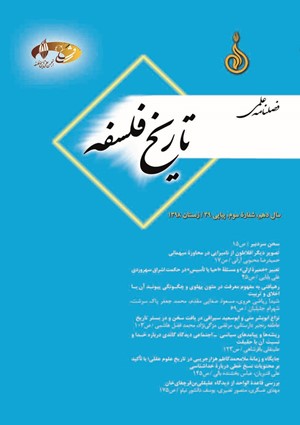بررسی حضور مؤلفههاي فكري سنت افلاطوني ـ افلوطيني در انديشة خواجه نصيرالدين طوسی
محورهای موضوعی : ریشهشناسی مکاتب و آراء فلسفی در ادوار قدیم و جدید
1 - استاديار گروه معارف اسلامي دانشگاه ملاير، ملایر، ایران؛
کلید واژه: تطور تاريخي ديدگاههاي فلسفي و كلامي سنت افلاطوني ـ افلوطيني تاريخ فلسفه اسلامي خواجه نصيرالدين طوسي,
چکیده مقاله :
حکمت و فلسفه در ايران پس از اسلام و همچنين در ديگر نقاط جهان اسلام، از طريق نهضت ترجمه با حکمت يوناني پيوند خورده و به تعامل رسيده است. خواجه نصيرالدين طوسی از جمله انديشمندان برجسته در جهان اسلام است كه از طريق حكمت مشاء و آثار فارابي و ابنسينا، با فلسفة يونانی آشنا شده و با ابتكارات خود بر غنای آن افزوده است. حال پرسش اينجاست که کداميک از مؤلفه های فکری حکمت يونانی، بويژه سنت افلاطونی ـ افلوطينی، در انديشههای فلسفی و کلامی خواجه نصيرالدين طوسی حضور دارد؟ در اين پژوهش كه با روش توصيفی ـ تحليلی و با مراجعه به آثار خواجه نصير صورت گرفت، دريافتيم که اين حضور و مشابهت در قالب اشکال مختلفی بروز كرده است كه عبارتند از: 1) پذيرش کامل و بدون تغيير، گرچه همراه با جابجايي، ديدگاههاي يوناني؛ مانند اكثر مسائل منطق، مبحث مقولات دهگانه، علل اربعه و تقسيمات علوم؛ 2) تکميل، تغيير و افزودن براهيني بر اثبات ديدگاههاي پيشين؛ مانند مسئلة امتناع تسلسل، تجرد نفس، اثبات واجب، توحيد واجب، امتناع صدور كثير از واحد، اتحاد عاقل و معقول و جوهريت صور نوعيه؛ 3) تغيير محتوا و ماهيت ديدگاههاي يوناني در عين حفظ نام و عنوان قديمي آنها؛ مانند مثل افلاطونی.
After the rise of Islam, philosophy and wisdom in Iran and in other corners of the world of Islam were united with Greek philosophy and interacted with it through the Translation Movement. Khwājah Naṣīr al-Dīn Ṭūsī was of the prominent thinkers of the world of Islam who became familiar with Greek philosophy and enriched it in the light of his innovations through the Peripatetic Philosophy and the works of Fārābī and Ibn Sīnā. Now, the question is which of the philosophical elements of Greek wisdom, particularly the Platonic-Plotinian tradition, is more visible in Ṭūsī’s philosophical-kalāmī thoughts. This study, which was carried out following a descriptive-analytic method and through exploring Ṭūsī’s works, concludes that this presence and similarity have emerged in different forms, including: 1) complete acceptance of Greek views without any change though with some displacement of Greek views, such as the most logical problems, the discussion of the ten-fold categories, the four-fold causes, and classifications of sciences; 2) completion, change, and addition of some arguments for demonstrating the previous views, such as the problem of impossibility of endless chain, immateriality of the soul, proving the Necessary, oneness of the Necessary, impossibility of the emanation of many from the one, union of the intellect and intelligible, and the substantial nature of archetypes, and 3) the change of the content and nature of Greek views while preserving their old names, such as Platonic Ideas.
ابراهيم مصطفي و ديگران (1998م) المعجم الوسيط، استنابول: دارالدعوه.
ابن سينا، حسين بن عبدالله (1375) الإشارات و التنبيهات، قم: نشرالبلاغه.
ابن سينا، حسين بن عبدالله (1403ق) الاشارات و التنبيهات (مع المحاكمات)، شرح خواجه نصيرالدين طوسي، قم، دفتر نشر کتاب.
ابن سينا، حسين بن عبدالله (1404ق) الشفاء ـ الإلهيات، تصحيح سعيد زائد و الاب قنواتى، قم: كتابخانة آيتالله مرعشي نجفي.
ارسطو (1980م) في النفس و يليه الآراء الطبيعية و الحاس و المحسوس و النبات، شرح نيکولاي دمشقي، ترجمه اسحاق بن حنين، قسطا بن لوقا و ثابت بن قره، تحقيق عبدالرحمن بدوي، بيروت: دار القلم.
ايجي، عضدالدين (بي¬تا) المواقف، بهمراه شرح تفتازاني، قم: الشريف الرضي.
بَدَوي، عبدالرحمن (1978م) ارسطو عند العرب، کويت: وکالة المطبوعات.
بروجردى، مصطفى (1380) بازنگارى اساس الاقتباس، تهران: وزارت فرهنگ و ارشاد اسلامى.
جهامي، جيرار (2002م) موسوعة مصطلحات الکندي و الفارابى، بيروت: مکتبة لبنان ناشرون.
دري، ضياءالدين (1330) کنز المسائل في اربع رسائل، تهران: خيام.
دورانت، ويليام جيمز (1337) تاريخ تمدن، ترجمة احمد آرام، تهران: اقبال.
راسل، برتراند (1945م) تاريخ الفلسفة الغربية، ترجمة زكى نجيب محمود، قاهره: الجنة التأليف و النشر.
شعراني، ابوالحسن (1372) كشف المراد؛ شرح فارسى تجريد الإعتقاد، تهران: كتابفروشى اسلاميه.
شيرواني، علي (1388) ترجمه و شرح كشف المراد، قم: دارالعلم.
طباطبايي، محمدحسين (1388) شيعه در اسلام، قم: بوستان کتاب.
طوسى، خواجه نصيرالدين (1367) اساس الاقتباس، تهران: دانشگاه تهران.
طوسى، خواجه نصيرالدين (1375) شرح اشارات و التنبيهات، قم: نشر البلاغه.
طوسى، خواجه نصيرالدين (1413ق) اخلاق ناصري، تهران: دار علميه اسلاميه.
طوسى، خواجه نصيرالدين (1425ق) شرح الاشارات و التنبيهات، تحقيق حسن حسنزاده آملى، قم: بوستان کتاب.
طوسى، خواجه نصيرالدين (1383) اجوبة المسائل النصيرية، تهران: پژوهشگاه علوم انسانى و مطالعات فرهنگى.
طوسى، خواجه نصيرالدين (1405ق) تلخيص المحصل، بيروت: دار الأضواء.
طوسى، خواجه نصيرالدين (1407ق) تجريد الاعتقاد، تحقيق محمدجواد حسينى جلالى، تهران: مركز نشر اسلامي.
عبدالهي، مهدي (1398) «جايگاه و نقش خواجه نصيرالدين طوسي در کلام و حکمت»، پايگاه اطلاع رساني حوزه، https://hawzah.net/fa/ Discussion/View/73891/.
غفوريان، مهدي (1395) «خدا در فلسفه ارسطو و ابنسينا: مدخلي بر تفاوت بنيادين فلسفه ابنسينا از فلسفه ارسطو»، اسفار، س2، ش 3، ص122ـ116.
فخر رازي، محمدبن عمر (1384) شرح الإشارات و التنبيهات، مقدمه و تصحيح عليرضا نجفزاده، تهران: انجمن آثار و مفاخر فرهنگى.
فرحات، هانى (1389) انديشههاى فلسفى و كلامى خواجه نصيرالدين طوسى، ترجمه غلامرضا جمشيدنژاد، تهران: ميراث مكتوب.
کرم، يوسف (1954م) تاريخ الفلسفة اليونانية، بيروت: دارالقلم.
مبلغى آبادانى، عبدالله (1373) تاريخ اديان و مذاهب جهان، قم: سينا.
مطهري، مرتضي (1372) مجموعه آثار، قم: صدرا.


